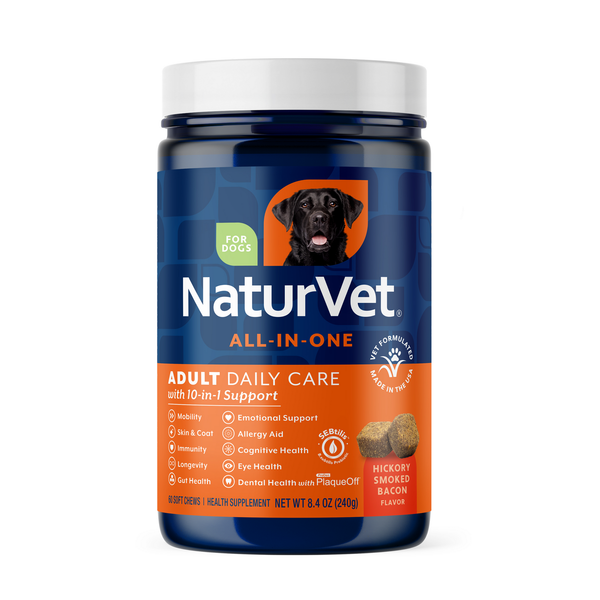The Health Benefits of Fish Oil for Dogs
Supplementing fish oil is very popular, both for people and pets. But what’s the basis for these recommendations? What exactly is fish oil, where does it come from, and what benefits are there to giving fish oil to your dog?
In this article, we’re going to cover everything you need to know about fish oil for dogs, including what it is, where it comes from, and what health benefits it can provide for your pup.
What is Fish Oil?
To understand what fish oil is, we really have to first discuss what it’s composed of, because this is really why supplementing fish oil is beneficial.
Fish oil is predominantly composed of omega fatty acids, which is what provide all of the health benefits. We’ll go over what fatty acids are and how they work in the body in both good and bad ways.

What Are Omega Fatty Acids?
Fatty acids don’t sound like a good thing. In fact, they sound like something you should avoid in your diet and avoid giving to your pup. But despite the bad reputation fat has in our society, both we and our pets require fats as a vital part of our nutrition.
Our need for fat requires a very delicate balance. In their simplest form, fats can be broken down into what are called fatty acids. Some fatty acids are essential, meaning we have to acquire them from our diet, while others are not considered essential because our bodies can make them.
Fatty acids can also have different properties. In the right balance, they can excel at fighting inflammation, nurturing brain health and development, keeping the heart healthy, and even aid in weight reduction. But with the wrong balance and types of fats, they certainly can be detrimental to our furry friends’ health and our own as well.
There are two categories of essential fatty acids that have different properties and require this delicate balance between them.
The first and most important are omega-3’s. There are a couple types of omega-3 fatty acids, which you may see listed separately on supplement labels.
DHA: an extremely important omega-3 for brain function and support, as it comprises nearly 10% of brain tissue.
EPA: produces compounds called eicosanoids, which help to reduce inflammation.
ALA: a precursor for EPA and DHA, ALA on its own has anti-inflammatory effects and protective effects for the heart and brain.
Omega-6 fatty acids are our other category. They also are essential and very important, but too much in the diet can be a bad thing, because they have pro-inflammatory properties.
Our bodies need some degree of an inflammatory response to fight infections and heal wounds. But too much inflammation can cause continued damage to our bodies and our pets’ bodies.
The primary omega-6 fatty acid is called arachidonic acid. It also produces eicosanoids like EPA does, but these eicosanoids are far more pro-inflammatory than the ones made by EPA.
Pro-inflammatory eicosanoids are necessary and used by the body’s immune system. But because too much inflammation can cause damage to cells and tissues, this is where the right amount of omega-6 is a good thing, but too much is definitely a bad thing.
And unfortunately, our diets as humans are overabundant in omega-6 fatty acids.
According to a 2017 article in Healthline, the Western world consumes far too many omega-6 fatty acids. The normal ratio should be about 4:1 omega-6 to omega-3. The average Western diet runs anywhere from 10:1 to 50:1. In humans, this has increased the risk for heart disease, diabetes, and inflammatory disease.
Until recent years, our pets’ diets may have been out of balance as well. Omega-6 fatty acids have traditionally been far more abundant in food sources and less expensive to include for manufacturers. Fortunately, many have recognized this and we’re seeing more diets with the right balance.
But without good omega-3 supplementation, an improper ratio may exist even in otherwise good quality commercial foods. Supplementing omega-3s to get as close to that 4:1 ratio as possible, is always beneficial. If you’re not sure if your pup’s food has omega-3 supplementation present, have your veterinarian take a look at the label for you.
Where Does Fish Oil Come From?

Omega fatty acids can come from many sources, both plant and animal, but the quality and types of fatty acids that come from these sources can be very different.
The most prolific sources of omega-3’s come from oily fish, with mackerel, cod, and salmon being the top fish sources. They can also be derived from krill, a small shrimp-like creature, and marine algae. Green-lipped mussel, native to the waters off the coast of New Zealand is also a prolific source.
ALA, the precursor to EPA and DHA if you recall, is found mostly in plant-based sources. This is where ingredients like flax seed and hemp seed are important to see on labels.
What Benefits Does Fish Oil Have for My Dog?
When it comes to supplementation, we’re really talking about adding the omega-3’s DHA and EPA, and sometimes ALA, to the diet. While it may not be wrong to supplement omega-6’s in balance with omega-3’s, omega-6’s are more abundant in nature and it’s less crucial to include them separately.
Joint Health
Adding EPA and DHA has been associated with reduced inflammation in the joints, thereby reducing pain as well.
For pups at risk of orthopedic disease, or just to promote joint health, consider a basic supplement, which has fish oil, flaxseed (our source of ALA if you remember) combined with glucosamine and chondroitin.
For severe joint disease, adding a fish oil supplement on its own is unlikely to show major results. But we can see a good synergistic effect when in combination with other joint health supplements like glucosamine, chondroitin, and MSM, which you can find in a supplement.
If you recall from earlier in the article, I mentioned that green lipped mussel from New Zealand also has omega fatty acids in it. But green lipped mussel isn’t the same as other marine sources because it has its own unique fatty acid.
In addition to EPA and DHA, green lipped mussel also has an omega-3 fatty acid called ETA. ETA has been shown in studies to have anti-inflammatory properties similar to non-steroidal anti-inflammatory drugs, blocking some of the same inflammation pathways. You can find green-lipped mussel in a supplement, in combination with other omegas and joint health supplements.
Lastly, considering an omega supplement that also contains plant-based sources of omega fatty acids can provide a more comprehensive spectrum by providing the precursor omega fatty acid ALA. Flaxseed oil is one source, but another common one is hemp seed.
Hemp seed is a great source of omega fatty acids, because it contains that exact ratio of omega-6 to omega-3 fatty acids that we want. And in addition to the fatty acid profile, hemp seed is also rich in protein and dietary fiber, making it a really nutritious dietary supplement.
You can find a great combination of hemp seed paired with our excellent marine sources of omega fatty acids.
Skin Health
Omega fatty acid supplements have also proven to be of great benefit for skin health as well. In addition to promoting proper skin moisture and a shiny coat, the anti-inflammatory effects of the omega-3 fatty acids can help to reduce redness and irritation of the skin.
The skin of our pets is constantly berated by allergens, both indoor and out. The complex immune system within the skin of our pups targets these allergens in different ways. Some pets seem not to have significant reactions to allergens, while others have chronic, year-round recurrence of skin inflammation, itching, and secondary infections.
Adding a fish oil supplement rich in omega-3 fatty acids can help to modulate some of the inflammatory changes that occur as a result of this process. While pets with severe skin allergies will likely need allergen immunotherapy or other medications in addition, mild or seasonal issues may be significantly aided by a supplement.
Other Health Benefits
While joint and skin health benefits of fish oil supplementation have the most evidence and use behind them, there are other purported benefits to fish oil supplements too. These include reducing risk factors for heart disease, slowing down mental decline, improving respiratory health, reducing the risk of some kinds of cancers, and improving sleep.

Final Fishy Thoughts
The numerous health benefits of supplementing fish oil for dogs is clear. Even if you don’t have a specific reason like joint arthritis or allergic dermatitis, for adding it to your pup’s daily regimen, supplementing omega-3’s in appropriate amounts can’t hurt.
At really high amounts you might see digestive upset, but at the amounts provided by most supplements, this is unlikely to happen. It’s more likely to see these side effects when pet parents over-use human supplements without consulting a veterinarian on proper dosing.
That’s why it’s easier and safer to find a good quality product approved for pets, with clear guidelines for supplementing.
So even if you have an otherwise young, healthy dog, consider adding fish oil as a preventative and general wellness supplement. It may help to slow down some chronic diseases that emerge slowly over time.
And if you have questions about the best type of supplement for your pup, make sure to consult with your veterinarian.























